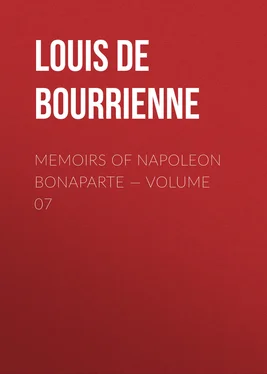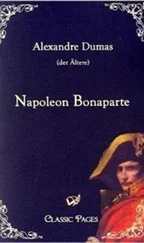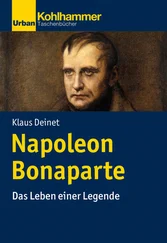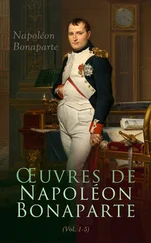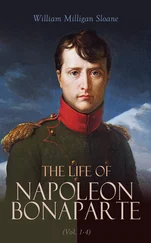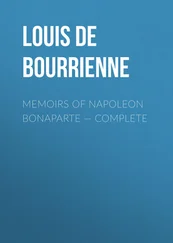Louis Bourrienne - Memoirs of Napoleon Bonaparte — Volume 07
Здесь есть возможность читать онлайн «Louis Bourrienne - Memoirs of Napoleon Bonaparte — Volume 07» — ознакомительный отрывок электронной книги совершенно бесплатно, а после прочтения отрывка купить полную версию. В некоторых случаях можно слушать аудио, скачать через торрент в формате fb2 и присутствует краткое содержание. Жанр: Биографии и Мемуары, История, foreign_edu, foreign_antique, foreign_prose, на английском языке. Описание произведения, (предисловие) а так же отзывы посетителей доступны на портале библиотеки ЛибКат.
- Название:Memoirs of Napoleon Bonaparte — Volume 07
- Автор:
- Жанр:
- Год:неизвестен
- ISBN:нет данных
- Рейтинг книги:4 / 5. Голосов: 1
-
Избранное:Добавить в избранное
- Отзывы:
-
Ваша оценка:
- 80
- 1
- 2
- 3
- 4
- 5
Memoirs of Napoleon Bonaparte — Volume 07: краткое содержание, описание и аннотация
Предлагаем к чтению аннотацию, описание, краткое содержание или предисловие (зависит от того, что написал сам автор книги «Memoirs of Napoleon Bonaparte — Volume 07»). Если вы не нашли необходимую информацию о книге — напишите в комментариях, мы постараемся отыскать её.
Memoirs of Napoleon Bonaparte — Volume 07 — читать онлайн ознакомительный отрывок
Ниже представлен текст книги, разбитый по страницам. Система сохранения места последней прочитанной страницы, позволяет с удобством читать онлайн бесплатно книгу «Memoirs of Napoleon Bonaparte — Volume 07», без необходимости каждый раз заново искать на чём Вы остановились. Поставьте закладку, и сможете в любой момент перейти на страницу, на которой закончили чтение.
Интервал:
Закладка:
Bonaparte's general dislike of literary men was less the result of prejudice than circumstances. In order to appreciate or even to read literary works time is requsite, and time was so precious to him that he would have wished, as one may say, to shorten a straight line. He liked only those writers who directed their attention to positive and precise things, which excluded all thoughts of government and censures on administration. He looked with a jealous eye on political economists and lawyers; in short, as all persons who in any way whatever meddled with legislation and moral improvements. His hatred of discussions on those subjects was strongly displayed on the occasion of the classification of the Institute. Whilst he permitted the reassembling of a literary class, to the number of forty, as formerly, he suppressed the class of moral and political science. Such was his predilection for things of immediate and certain utility that even in the sciences he favoured only such as applied to terrestrial objects. He never treated Lalande with so much distinction as Monge and Lagrange. Astronomical discoveries could not add directly to his own greatness; and, besides, he could never forgive Lalande for having wished to include him in a dictionary of atheists precisely at the moment when he was opening negotiations with the court of Rome.
Bonaparte wished to be the sole centre of a world which he believed he was called to govern. With this view he never relaxed in his constant endeavour to concentrate the whole powers of the State in the hands of its Chief. His conduct upon the subject of the revival of public instruction affords evidence of this fact. He wished to establish 6000 bursaries, to be paid by Government, and to be exclusively at his disposal, so that thus possessing the monopoly of education, he could have parcelled it out only to the children of those who were blindly devoted to him. This was what the First Consul called the revival of public instruction. During the period of my closest intimacy with him he often spoke to me on this subject, and listened patiently to my observations. I remember that one of his chief arguments was this: "What is it that distinguishes men? Education—is it not? Well, if the children of nobles be admitted into the academies, they will be as well educated as the children of the revolution, who compose the strength of my government. Ultimately they will enter into my regiments as officers, and will naturally come in competition with those whom they regard as the plunderers of their families. I do not wish that!"
My recollections have caused me to wander from the journey of the First Consul and Madame Bonaparte to the seabord departments and Belgium. I have, however, little to add to what I have already stated on the subject. I merely remember that Bonaparte's military suite, and Lauriston and Rapp in particular, when speaking to me about the journey, could not conceal some marks of discontent on account of the great respect which Bonaparte had shown the clergy, and particularly to M. de Roquelaure, the Archbishop of Malines (or Mechlin). That prelate, who was a shrewd man, and had the reputation of having been in his youth more addicted to the habits of the world than to those of the cloister, had become an ecclesiastical courtier. He went to Antwerp to pay his homage to the First Consul, upon whom he heaped the most extravagant praises. Afterwards, addressing Madame Bonaparte, he told her that she was united to the First Consul by the sacred bonds of a holy alliance. In this harangue, in which unction was singularly blended with gallantry, surely it was a departure from ecclesiastical propriety to speak of sacred bonds and holy alliance when every one knew that those bonds and that alliance existed only by a civil contract. Perhaps M. de Roquelaure merely had recourse to what casuists call a pious fraud in order to engage the married couple to do that which he congratulated them on having already done. Be this as it may, it is certain that this honeyed language gained M. de Roquelaure the Consul's favour, and in a short time after he was appointed to the second class of the Institute.
CHAPTER XXI
1804.
The Temple—The intrigues of Europe—Prelude to the Continental system—Bombardment of Granville—My conversation with the First Consul on the projected invasion of England—Fauche Borel—Moreau and Pichegru—Fouche's manoeuvres—The Abbe David and Lajolais— Fouche's visit to St. Cloud—Regnier outwitted by Fouche— My interview with the First Consul—His indignation at the reports respecting Hortense—Contradiction of these calumnies—The brothers Faucher—Their execution—The First Consul's levee—My conversation with Duroc—Conspiracy of Georges, Moreau, and Pichegru—Moreau averse to the restoration of the Bourbons—Bouvet de Lozier's attempted suicide—Arrest of Moreau—Declaration of MM. de Polignac and de Riviere—Connivance of the police—Arrest of M. Carbonnet and his nephew.
The time was passed when Bonaparte, just raised to the Consulate, only proceeded to the Temple to release the victims of the "Loi des suspects" by his sole and immediate authority. This state prison was now to be filled by the orders of his police. All the intrigues of Europe were in motion. Emissaries came daily from England, who, if they could not penetrate into the interior of France, remained in the towns near the frontiers, where they established correspondence, and published pamphlets, which they sent to Paris by post, in the form of letters.
The First Consul, on the other hand, gave way, without reserve, to the natural irritation which that power had excited by her declaration of war. He knew that the most effective war he could carry on against England would be a war against her trade.
As a prelude to that piece of madness, known by the name of the Continental system, the First Consul adopted every possible preventive measure against the introduction of English merchandise. Bonaparte's irritation against the English was not without a cause. The intelligence which reached Paris from the north of France was not very consolatory. The English fleets not only blockaded the French ports, but were acting on the offensive, and had bombarded Granville. The mayor of the town did his duty, but his colleagues, more prudent, acted differently. In the height of his displeasure Bonaparte issued a decree, by which he bestowed a scarf of honour on Letourneur, the mayor, and dismissed his colleagues from office as cowards unworthy of trust. The terms of this decree were rather severe, but they were certainly justified by the conduct of those who had abandoned their posts at s critical moment.
I come now to the subject of the invasion of England, and what the First Consul said to me respecting it. I have stated that Bonaparte never had any idea of realising the pretended project of a descent on England. The truth of this assertion will appear from a conversation which I had with him after he returned from his journey to the north. In this conversation he repeated what he had often before mentioned to me in reference to the projects and possible steps to which fortune might compel him to resort.
The peace of Amiens had been broken about seven months when, on the 15th of December 1803, the First Consul sent for me to the Tuileries. His incomprehensible behaviour to me was fresh in my mind; and as it was upwards of a year since I had seen him, I confess I did not feel quite at ease when I received the summons. He was perfectly aware that I possessed documents and data for writing his history which would describe facts correctly, and destroy the illusions with which his flatterers constantly, entertained the public. I have already stated that at that period I had no intention of the kind; but those who laboured constantly to incense him against me might have suggested apprehensions on the subject. At all events the fact is, that when he sent for me I took the precaution of providing myself with a night-cap, conceiving it to be very likely that I should be sent to sleep at Vincennes. On the day appointed for the interview Rapp was on duty. I did not conceal from him my opinion as to the possible result of my visit. "You need not be afraid," said Rapp; "the First Consul merely wishes to talk with you." He then announced me.
Читать дальшеИнтервал:
Закладка:
Похожие книги на «Memoirs of Napoleon Bonaparte — Volume 07»
Представляем Вашему вниманию похожие книги на «Memoirs of Napoleon Bonaparte — Volume 07» списком для выбора. Мы отобрали схожую по названию и смыслу литературу в надежде предоставить читателям больше вариантов отыскать новые, интересные, ещё непрочитанные произведения.
Обсуждение, отзывы о книге «Memoirs of Napoleon Bonaparte — Volume 07» и просто собственные мнения читателей. Оставьте ваши комментарии, напишите, что Вы думаете о произведении, его смысле или главных героях. Укажите что конкретно понравилось, а что нет, и почему Вы так считаете.
